Get to Know California’s State Refugee Coordinator
Kathy Yang
Refugee Awareness Events
Afro Fusion Dance Celebration Online event
L.A. County Celebrates Refugee Awareness Month
Refugee Crisis Profiles
Sudan | Afghanistan | Syria | Somalia
Refugee Profiles
Nemat's Story | Ndizeye's Story | Abdul's Story | Nadia's Story | Hasal's Story | Balan's Story
Nemat's Story
Submitted by Sacramento Food Bank and Family Services
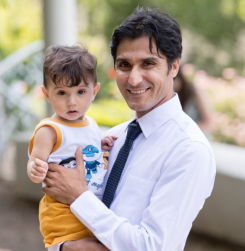
Five years after arrival in the United States, Nematullah Sadat is well on toward his goal of a legal career in the United States. Nemat grew up in Mazar-i-Sharif, Afghanistan, attended law school and was hired to support American troops and European police missions during the international society involvement in Afghanistan after 9/11. Because his positions as translator and support services officer put him and his family in danger after the American troops left Afghanistan, Nemat was approved for Special Immigrant Visa (SIV) status in January 2015. Although Nemat was relieved he and his family would be safe in the United States, it was heartbreaking to leave the rest of his family and his community behind.
His resettlement case was assigned to Sacramento Food Bank & Family Services (SFBFS) and after receiving the initial 90 days of case management services, he volunteered to help the agency that had helped him. In this way, Nemat said, “I can pay forward to others in the community.” It wasn’t long before SFBFS hired Nemat on a contractual basis, then asked him to work part-time, and soon appointed him as a full-time case manager. Eventually Nemat was promoted to Refugee Resettlement Coordinator. One refugee client said of Nemat, “He is more to me than my case manager. He has become a friend. He is like family.”
Nemat‘s advice to other refugees comes from experience. He advised them to make both short and long-term goals, and to take advantage of every possible opportunity, especially in education. He practices what he preaches. While working full time at SFBFS, he attended classes that would help him bridge the gap between his legal education in Afghanistan and his desire to work in the legal field here in the United States. In December of 2019, Nemat began his new position of office specialist with the Sacramento County District Attorney’s Office.
Nemat’s wife is achieving her educational goals as well. Khatera, in addition to caring for their three children, is determined to learn English and immediately enrolled in ESL classes. Realizing how difficult it is to get anywhere without a car, Khatera also soon learned to drive. She now attends courses at American River College. Their daughters, Zuhal aged three and Hadia aged one when they arrived five years ago, now speak English fluently. Zuhal’s first words in English were, “Good job!” Their son, Hasib, was born after arrival in the United States and is growing up with the benefit of speaking three languages, Pashto, Dari and English.
“You know, if you look at the history of the United States and read stories of others coming here, you realize how this country can be your country too.”
Ndizeye’ Story - 16 Years in a Rwandan Refugee Camp
Submitted by Catholic Charities Diocese of San Diego
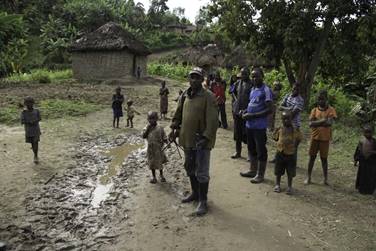
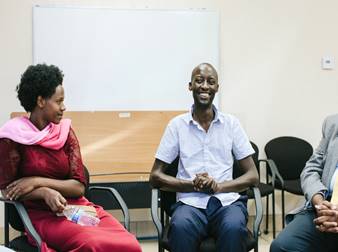
Ndizeye can remember the day nearly two decades ago when he was forced to flee his home in the Democratic Republic of the Congo (DRC). The soldiers. The guns. The shouting. The crying. “We knew what was about to happen if we stayed,” he says.
He walked alongside others from his village for three days through the unforgiving terrain of eastern DRC to Gihembe refugee camp in Rwanda, where he lived for 16 years before he and his wife, Uwimana, were resettled in the U.S. in 2019.
Ethnic conflict and economic despair have continually destabilized the DRC since long before Google existed. The 100-day slaughter of 800,000 Tutsis and moderate Hutus carried out by Hutu extremists during the 1994 Rwandan genocide led Rwanda to invade neighboring Zaire (present-day DRC) in 1996. This triggered the First Congo War and hundreds of thousands of deaths more as Rwanda and its coalition sought to kill any remaining perpetrators of the genocide who may have fled to Zaire.
While the First Congo War brought a new government and the renaming of Zaire to the Democratic Republic of the Congo in 1997, the deep-rooted tension that remained would soon erupt into the Second Congo War, considered by some to be World War III. From 1998 to 2008, 5.4 million people died. Ndizeye made it out alive in 2003, the year the war formally ended (though the casualties did not).
Ndizeye was 23 years old when he arrived at Gihembe refugee camp in Rwanda. He met and married Uwimana there in 2005. Asked to recall the details of how she first arrived at Gihembe, Uwimana’s face drops. Then, her head. “It was terrible,” she says.
Uwimana had lost both of her parents and her sister. She lived by herself among some-20,000 Congolese refugees in Gihembe before meeting Ndizeye.
Refugees in Rwanda’s five established camps receive 7,600 Rwandan francs, the equivalent of roughly nine U.S. dollars, per person, per month. They live in homes built from little more than plywood sheathing. They’re fortunate for the shelter, safety and assistance—yet it is difficult to survive and remain healthy on so little and in a region plagued by illness. The current Ebola outbreak in the DRC is the second largest in history.
“You are safer from the killing and sickness, but you are not at home,” Ndizeye says. “There is not enough food, water. Things are not enough. You are just getting the minimum to sustain.”
Ndizeye was able to earn a small additional sum teaching social studies in the camp, which required him to pass a national exam and train himself. The extra money helped him support his three children—one daughter and two sons—all of whom Uwimana gave birth to while living in Gihembe.
When Ndizeye was informed that he and his family would be accepted into the U.S., he spent a month communicating with various members of Catholic Charities’ refugee services team in preparation for the journey. We arranged for a medical escort to accompany Uwimana, who suffers from diabetes, and met the family at San Diego International Airport upon their arrival on January 18, 2019, to take them to their new, two-bedroom apartment in City Heights.
As I’m speaking with Ndizeye, his cell phone is making all sorts of noise. It seems as if he’s reading text messages. I eventually ask who is contacting him. It’s his employer.
Ndizeye works for a large paper product manufacturer in San Diego, taking the bus and trolley more than an hour each way. He returns home from work around midnight. During the day, Uwimana walks the kids to and from school, attending English classes herself in between.
“We are feeling okay,” Ndizeye says. “We can move around during the day or at night, not feeling like we will face problems. We can buy food and get the necessities. It’s a good feeling.”
Ndizeye notices that in America, there is not as much time spent with neighbors as in Rwanda. Everyone is busy—himself included. His next step is to get a car so that he can move faster. It is not easy to provide. It is not easy to adapt. But he hopes more refugees are given the opportunity.
“They have the energy and ability to work,” Ndizeye says. “If they can get resettled and have a nationality here in the U.S., they can keep being useful, get a good education and solve problems instead of being in a refugee camp for years and years.”
Merciful First Impressions: Abdul’s Story
Submitted by Catholic Charities Diocese of San Diego
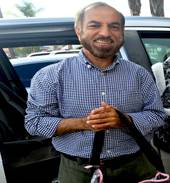
Turmoil. Conflict. Chaos. These are just a few words that come to mind when I was asked to share my story. My story begins 35 years ago, I lost 17 members of my family as a result of the Afghanistan crisis. People I loved and cared about were gone too soon, I didn’t have time to even process what I’d lost, I was fighting to stay alive. I knew I needed to escape my country. With so much hardship surrounding me, it was hard to be optimistic. I would close my eyes and pray it would be over soon.
My focus was to leave Afghanistan, I knew it wasn’t going to be easy. I faced a long and hard journey ahead of me. I escaped to Pakistan and shortly after I fled to Hamburg, Germany. It was there where I finally saw a gleam of hope: Catholic Charities’ Refugee Services. A friend referred me to the program and as soon as I stepped into the office, I immediately felt welcomed. Catholic Charities took me in and provided a safe refuge for me to resettle in San Diego.
“I escaped to Pakistan and shortly after I fled to Hamburg, Germany. It was there where I finally saw a gleam of hope: Catholic Charities’ Refugee Services. A friend referred me to the program and as soon as I stepped into the office, I immediately felt welcomed. Catholic Charities took me in and provided a safe refuge for me to resettle in San Diego.”
My first year in San Diego I immersed myself into the culture of America. I learned English at a nearby community college. After completing my language course, I got an offer to work at Catholic Charities in transportation. Throughout the years, I got involved in several programs in a few different departments, but now my official title is Driver for Catholic Charities’ Refugee Services.
I feel very blessed to be in my position. Families come to me after weeks of traveling, days of long flights and hours of no sleep. Many refugees come with nothing—no luggage or bags, just the clothes on their backs, the weight of the world they just escaped and a dream of a better life.
Even though I love what I do, my job is not always easy. Every day I’m picking up between five, sometimes up to ten, families. We help all kinds of people coming to America: widows, orphans, the elderly. Many of these refugees are exhausted, disabled, sick, pregnant or have small children in tow and don’t have the energy to talk. Our program helps refugees from more than 80 different countries, which means I also need to have a general understanding of various cultures.
I am the first impression and interaction for each of these refugees. I am the first person they try and talk to when they are scared, exhausted and barely comprehending they don’t have to run anymore. Not only do I pick up refugees from the airport, but I am also responsible for driving these families while they are receiving services in their program. From citizenship appointments to finding housing and medical care, I have the opportunity to connect with people each time I drive them.
Something particularly special about my position is seeing how I made an impact on lives years later. Many years ago, I picked up a family from the Congo with a four-year-old daughter. Two years ago, she returned to Catholic Charities as a caseworker. Another man I picked up years ago went off to college and eventually returned to Catholic Charities as my supervisor. He also became my teacher at City College, and now is getting a PhD and working for the county. I love being able to see how our journeys intertwined and where these families are now. It is truly a blessing to watch everything come full circle and be a part of Catholic Charities’ mission to help these marginalized people succeed.
I cannot express enough how much Catholic Charities impacted my life. They graciously sponsored my family and brought my mom, dad, sister and brother to San Diego. In addition, Catholic Charities helped me go back to Afghanistan to marry my wife and bring her back to the States. Today, we have a family of five kids (three of which just graduated from California universities). It goes to show the compassion of Catholic Charities. Everyone here goes the extra mile to help people get to a safe place and put them on a path of success.
Catholic Charities has created a second home of love, respect and mercy for all those in need. For both the refugees and all of us who work at Refugee Services, Catholic Charities has developed a friendly and loving environment that makes it an amazing community to be a part of. Through their Refugee Services program, I am able to provide for my family while helping other people who are in the position I was once in.
“Catholic Charities has created a second home of love, respect and mercy for all those in need. For both the refugees and all of us who work at Refugee Services, Catholic Charities has developed a friendly and loving environment that makes it an amazing community to be a part of.”
Every day I continue to pray for Catholic Charities and all the refugees that we help. I pray that God continues to use me to show His mercy and grace to others through every interaction.
Creating Better Futures for Families: Nadia’s Story
Submitted by Catholic Charities Diocese of San Diego
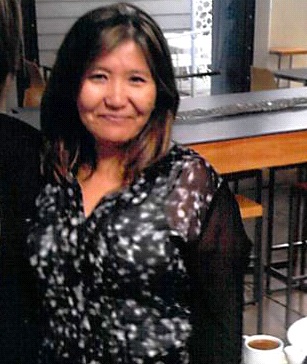
My story is inspired by the search for a better life. It’s a story about creating a better future for my family—as well as being able to pay it forward to other families. But before I get ahead of myself, let’s go back to the beginning.
As a minority living in Russia, I was no stranger to prejudice, injustice and discrimination. Despite these challenges, I kept fighting for a better future, I was uneasy in my life and I had to figure out why. I decided to pursue my dream to become a lawyer. As time went on, I still felt like something was missing. While I enjoyed my work, I still wasn’t feeling fulfilled. I wanted to give back in some way. This led me to become involved with more human rights work. I started volunteering at a non-profit organization where I worked in an orphanage for disabled children with both mental and physical impairments. This is where my passion to advocate for vulnerable, disenfranchised groups who are in need of help first began.
In 1998, trying to escape the prejudice and limitations my family faced in Russia, we set off for a new life in the United States. Not sure what to expect, I found myself in a new country, speaking a new language and living a completely different life than I was accustomed to. During my first few years in America, I struggled, struggled with the language, fitting in, trying to find a job that was the right fit for me. I was working at a legal organization that didn’t support me or my desire to take the bar exam. In spite of my employer not allowing me to take time off, I continued to follow my heart to provide a better future for my children. I was fueled by my passion and worked late hours, studying every free moment. In 2008, I passed the California Bar Exam and officially became an attorney.
From there I began practicing law, taking on various pro-bono cases while remaining active in the San Diego community. I got my first immigration case, and I knew that this was it. This was exactly where I was supposed to be. As an immigrant myself, I fell in love with this area of law as I immediately felt a spark of connection to all my clients. I knew I had found my calling and decided to specialize in immigration practice to help those like me.
I started looking into different non-profit organizations and continued to hear great things about Catholic Charities. I applied and was offered a position as a Senior Immigration Attorney for Catholic Charities’ Immigration Services. That was nearly two years ago—and I could have never expected it to take me where I am today.
Every day I have the opportunity to advocate for clients who are all from different walks of life. From legal support and advice to managing other attorneys, even though there are huge challenges, I truly love what I do. I have the ability to work with refugees, immigrants, children and many other groups facing challenges similar to ones I’ve been through myself.
It wasn’t until I found Catholic Charities that I finally felt fulfilled in my career. Catholic Charities’ mission of advocating for a just society by calling individuals to action on behalf of the poor, vulnerable and marginalized completely aligns with my personal values. Being able to personify mercy and hospitality through serving others is a mission that I feel very blessed to be a part of. Likewise, everyone I work with is aligned in this mission and I feel supported by my entire team. I could not achieve my successes without them; we are working together for a greater good and our number one focus is always about putting people first. I enjoy putting my skills and knowledge to the best use and am constantly learning more and more every day. Helping people and defending vulnerable members in my community has always been an important part of my life. I know that Catholic Charities is my home, this is exactly where I am supposed to be.
“I know that Catholic Charities is my home, this is exactly where I am supposed to be.” I am very thankful to Catholic Charities for allowing me to live out my passion. Thanks to this loving and supportive organization, I can be a part of a bigger story and help create better futures for families.
Hasel’s Story
Submitted by International Institute of Los Angeles
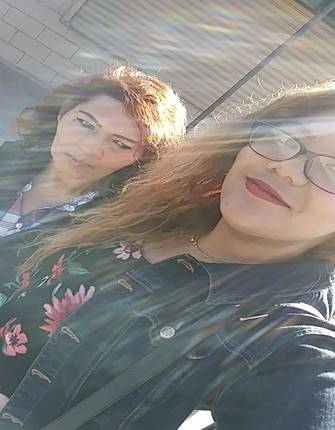
My name is Hasel Bercian, I am a 21 years old Salvadoran refugee who came to the United States in 2016 thanks to the Central American Minors (CAM) Program. Being part of the “CAM Generation” changed my life completely. In 2015, my mom told me about the CAM program, I did not believe it was possible for me to come to the United States legally. I started my process with the International Organization for Migration (IOM) in El Salvador in 2015, while my mom was receiving help with the process in the U.S. from the International institute of Los Angeles (IILA). Going through this process and seeing how these two organizations were working together to find a safe place people in El Salvador was inspiring because hundreds of immigrants leave El Salvador and face an unsafe journey because they do not have the support of organizations like IILA and IOM. I arrived to the U.S in July, 2016. My resettlement case manager guided and provided on-going support to me and my family. When I started High School I was sad because I did not speak English and had a long journey ahead of me before thinking of graduating. Two years later, I graduated and started attending Chaffey College pursuing a major in Global Studies. I enrolled at Chaffey College’s honors program; I became the vice president of a club and I did a lot volunteer work with Border Angels, an organization that helps immigrants at the border. April, 2020 I received my letter of acceptance from UC Berkley, my dream school. I share my story because I am an immigrant who arrived just a few years ago from a country where my life was in danger and today I am here. I want to give back and help others as IILA and IOM helped me. I want to help others who are in need of safety or those who do not have a voice to fight for their rights. My family is my motivation, I want to make them proud, specially my mom who has worked really hard in the U.S. so that I can accomplish my dreams. I want to say thanks to all the organizations that supported me and remind people that we can accomplish our dreams, it is hard but not impossible.
Balan’s Story
Submitted by World Relief Sacramento Before coming to Sacramento, Balan was a Christian marriage family therapist in Malaysia. Against Malaysia’s backdrop of religious unrest, he was targeted by radical groups, and his therapy practice was destroyed. Having traveled to the U.S. previously and securing a 10 year visa, he thought he would be able to come to America and make a plan first and then have his wife and their two children join him. Upon arrival at the San Francisco airport, however, he was stopped by U.S. Customs and Border Protection (CBP) and sent to a detention center. In the detention center, he filed his own application for asylum without legal help. These sorts of appeals rarely get approved, but Balan’s asylum was granted on the 100th day of his detention. He moved to Sacramento and began searching for organizations that might be able to help him. From his search, he found World Relief Sacramento (WRS) and, because WRS is faith based, reached out to see what kinds of services he might qualify for.
Becca Ghonim, Integration Manager at WRS, told him about their Fresh Start program where they could help him find a place to live, cover his first few months’ expenses, and help him find a job, so that he would become self-sufficient. Soon after enrolling in Fresh Start, Balan was hired at the Sacramento airport working for SSP America in food service. In addition to being a marriage and family therapist, he loves to cook. He was quickly promoted and currently works with United Airline’s food distribution.
In Balan’s words, the Fresh Start program and assistance he received from World Relief Sacramento “prepared and molded” him for entering the American workforce. Balan’s dream is to open his own food truck and to hire refugees and asylum seekers. During shelter in place, he has started his own YouTube cooking channel where he shares his culinary passion with others. He is in the process of petitioning for his wife and children to join him. He is both patient and hopeful that they will be reunited, and as a family their new home will be Sacramento. To watch Balan’s cooking videos, he said everyone can “follow and subscribe” to his YouTube channel .